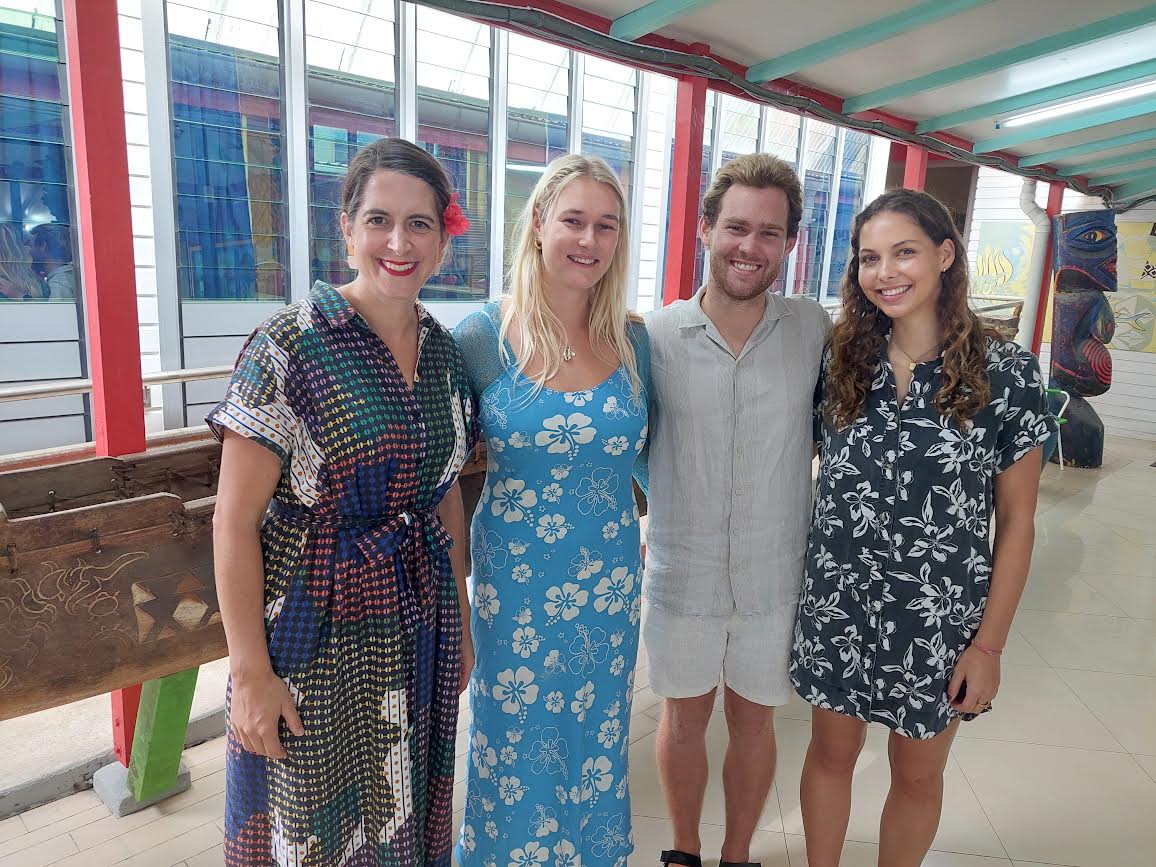Scholarship programmes connecting Australia and the Cook Islands return
Monday 4 September 2023 | Written by Joanne Holden | Published in Education, National

Australian High Commissioner to the Cook Islands, Phoebe Smith, left, with New Colombo Plan students Ella Ruland, Liam Clegg, and Ebony Gatto. 23090116
A scholarship programme sending Australian undergraduates to study in more than 40 locations across the Indo-Pacific region has returned to the Cook Islands after Covid-19 ground travel to a halt.
Liam Clegg, Ebony Gatto, and Ella Ruland make up the latest wave of Australian university students to arrive in the Cook Islands on the New Colombo Plan, an initiative started by the Australian Government in 2014 with an aim of building knowledge and connections between the country and its Indo-Pacific neighbours.
“There are thousands of Cook Islanders who go to Australia to pursue education opportunities, this is a great way of encouraging the two-way flow of students back to the Cook Islands,” says Phoebe Smith, Australian High Commissioner to the Cook Islands.
“The New Colombo Plan is more than just a study programme.
“For scholars like these, it encourages students to immerse themselves in the local community; to undertake internships and research; and to build connections in the Cook Islands.”
Marine science is what interests the three arrivals, who are being hosted by the University of the South Pacific (USP).
Clegg, a recent graduate of the University of Tasmania with a Bachelor of Marine and Antarctic Science, landed in Rarotonga on July 11 to begin studying towards a Bachelor of Arts majoring in marine management at USP.
He hopes to undertake an internship with the Cook Islands Ministry of Marine Resources (MMR).
“Looking for a change of pace, change of scenery, change of weather – I found the Cook Islands,” Clegg says.
“The Ra’ui system here really caught my eye. I sort of centred my programme around how that works and the importance of community participation in marine protected area management.
“I’d heard the people were also fantastic, which has definitely been proven since I moved.
“It’s been great fun so far.”
Gatto – a Deakin University student working towards a Bachelor of Environmental Science (Wildlife and Conservation Biology) – started her New Colombo Plan scholarship in Tahiti, French Polynesia, where she helped a marine wildlife organisation with their identification efforts.
Gatto headed to India next to continue her study, and finally the Cook Islands on August 8.
With whale migration as her area of interest, Gatto was “very happy” to see humpback whales still swimming beyond the reef around Rarotonga.
“I’ve only been here a few weeks, but everyone is so friendly. The island is beautiful and I’m so keen to keep exploring and learning more.”
Ruland, who also began her scholarship in Tahiti studying French and interning at a dive shop before arriving in Rarotonga on July 15, is doing a research-based Bachelor of Marine Science Honours programme studying the humpback whale migration.
“Rarotonga is a really crucial migratory stopover for the humpbacks,” Ruland, of Murdoch University, says.
“It’s been really beautiful to see them in great numbers just off the shore. I’m lucky to be supported by Cook Islands Whale Research, so I’ve been going out with them almost daily – whenever we get the chance, and whenever the weather’s permitting.
“It’s also an amazing location for land-based surveys because the reef is so close to shore.”
Ruland says she is “very grateful” to USP for hosting her as an affliate researcher, and to MMR for their help with getting her research permit and undertaking that research.
All three students expressed their gratitude to USP and MMR, with Clegg adding they were thankful to the Cook Islands community for “welcoming us with open arms and making our experience so warm and the move so seamless”.
Smith says it is “terrific” to see a new wave of New Colombo Plan students to the country.
“Here in the Cook Islands, we’ve seen the programme develop over the past few years. It’s been a bit impeded by Covid, so that’s why we’re delighted to see students returning this year,” she says.
“The aim of the programme is to spark that interest for students and give them a taste.
"I’m really delighted that we’ll actually be welcoming another staff member [at the Australian High Commission] back to Rarotonga in a few weeks, Tully Hambridge, who was here in 2018 as a New Colombo Plan student.
"I think that’s a great demonstration of the full circle of the programme.”
USP Cook Islands campus director Dr Debbie Futter-Puati says hosting the three Australian students was part of an “international education plan” the campus had been developing for years.
The initiative kicked off with a three-week visit from a linguistics and computer science assistant professor and nine students from Ivy League research university Dartmouth College in the United States, Futter-Puati says.
Alongside a Maori and Pacific senior lecturer from New Zealand’s Auckland University, the academics produced audio and visual recordings of traditional stories to document the Cook Islands Maori language in February and March this year.
Futter-Puati says with Clegg, Gatto, and Ruland focussing on marine science for their visit, they would benefit from the campus’ “great connections” with MMR and National Environment Service.
“It’s brilliant that the Australian Government has funded these scholarships,” she says.
“I think it’s just such a beautiful win-win situation for our country and the Australian students coming and being part of our little campus.”
The USP Students’ Association is making sure the scholars are feeling welcome and connected in the community, Futter-Puati says.














































